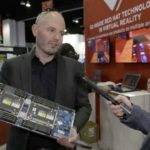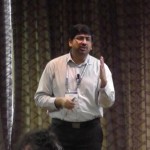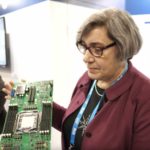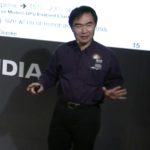Steve Oberlin from NVIDIA gave this talk at SC17 in Denver. “HPC is a fundamental pillar of modern science. From predicting weather to discovering drugs to finding new energy sources, researchers use large computing systems to simulate and predict our world. AI extends traditional HPC by letting researchers analyze massive amounts of data faster and more effectively. It’s a transformational new tool for gaining insights where simulation alone cannot fully predict the real world.”
Video: Red Hat Showcases ARM Support for HPC at SC17
In this video from SC17, Jon Masters from Red Hat describes the company’s Multi-Architecture HPC capabilities, including the new ARM-powered Apollo 70 server from HPE. “At SC17, you will also have an opportunity to see the power and flexibility of Red Hat Enterprise Linux across multiple architectures, including Arm v8-A, x86_64 and IBM POWER Little Endian.”
Adapting Deep Learning to New Data Using ORNL’s Titan Supercomputer
Travis Johnston from ORNL gave this talk at SC17. “Multi-node evolutionary neural networks for deep learning (MENNDL) is an evolutionary approach to performing this search. MENNDL is capable of evolving not only the numeric hyper-parameters, but is also capable of evolving the arrangement of layers within the network. The second approach is implemented using Apache Spark at scale on Titan. The technique we present is an improvement over hyper-parameter sweeps because we don’t require assumptions about independence of parameters and is more computationally feasible than grid-search.”
The AI Future is Closer than it Seems
Gadi Singer gave this talk at the Intel HPC Developer Conference in Denver. “Technology visionaries architecting the future of high-performance computing and artificial intelligence (AI) will share the key challenges as well as Intel’s direction. The talk will cover the adaptation of AI into HPC workflows, along their perspective architectural developments, upcoming transitions and range of solutions, technology opportunities, and the driving forces behind them.”
Visualization on GPU Accelerated Supercomputers
Peter Messmer from NVIDIA gave this talk at SC17. “This talk is a summary about the ongoing HPC visualization activities, as well as a description of the technologies behind the developer-zone shown in the booth.” Messmer is a principal software engineer in NVIDIA’s Developer Technology organization, working with clients to accelerate their scientific discovery process with GPUs.
Video: Deep Learning for Science
Prabhat from NERSC and Michael F. Wehner from LBNL gave this talk at the Intel HPC Developer Conference in Denver. “Deep Learning has revolutionized the fields of computer vision, speech recognition and control systems. Can Deep Learning (DL) work for scientific problems? This talk will explore a variety of Lawrence Berkeley National Laboratory’s applications that are currently benefiting from DL.”
Video: A Closer Look at the Atos Dibona Prototype for ARM-based HPC
In this video from SC17 in Denver, Pascale Bruner from Atos describes the company’s innovative ARM-HPC technologies developed as part of the Mont-Blanc Project. “Atos will showcase our Dibona prototype for ARM-based HPC. Named after the Dibona peak in the French Alps, the new prototype is part of the Phase 3 of Mont-Blanc and is based on 64 bit ThunderX2 processors from Cavium, relying on the ARM v8 instruction set.”
Converging HPC, Big Data, and AI at the Tokyo Institute of Technology
Satoshi Matsuoka from the Tokyo Institute of Technology gave this talk at the NVIDIA booth at SC17. “TSUBAME3 embodies various BYTES-oriented features to allow for HPC to BD/AI convergence at scale, including significant scalable horizontal bandwidth as well as support for deep memory hierarchy and capacity, along with high flops in low precision arithmetic for deep learning.”
Intel Omni-Path Architecture: The Real Numbers
In this slidecast, Joe Yaworski from Intel describes the Intel Omni-Path architecture and how it scales performance for a wide range of HPC applications. He also shows why recently published benchmarks have not reflected the real performance story.
Microsoft to acquire Avere Systems
Over at the Microsoft Blog, Jason Zander writes that the company is acquiring Avere Systems. “By bringing together Avere’s storage expertise with the power of Microsoft’s cloud, customers will benefit from industry-leading innovations that enable the largest, most complex high-performance workloads to run in Microsoft Azure. We are excited to welcome Avere to Microsoft, and look forward to the impact their technology and the team will have on Azure and the customer experience.”













